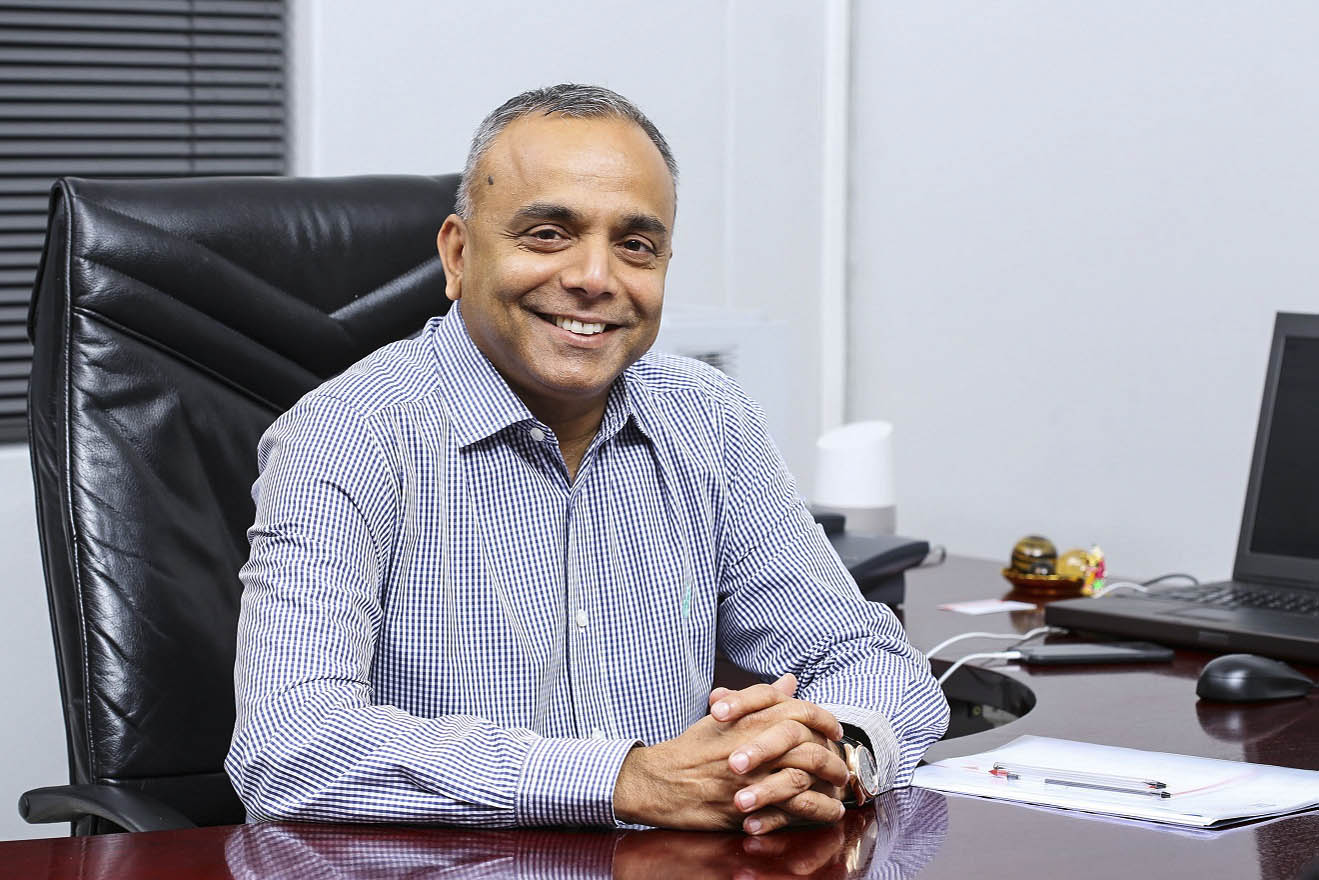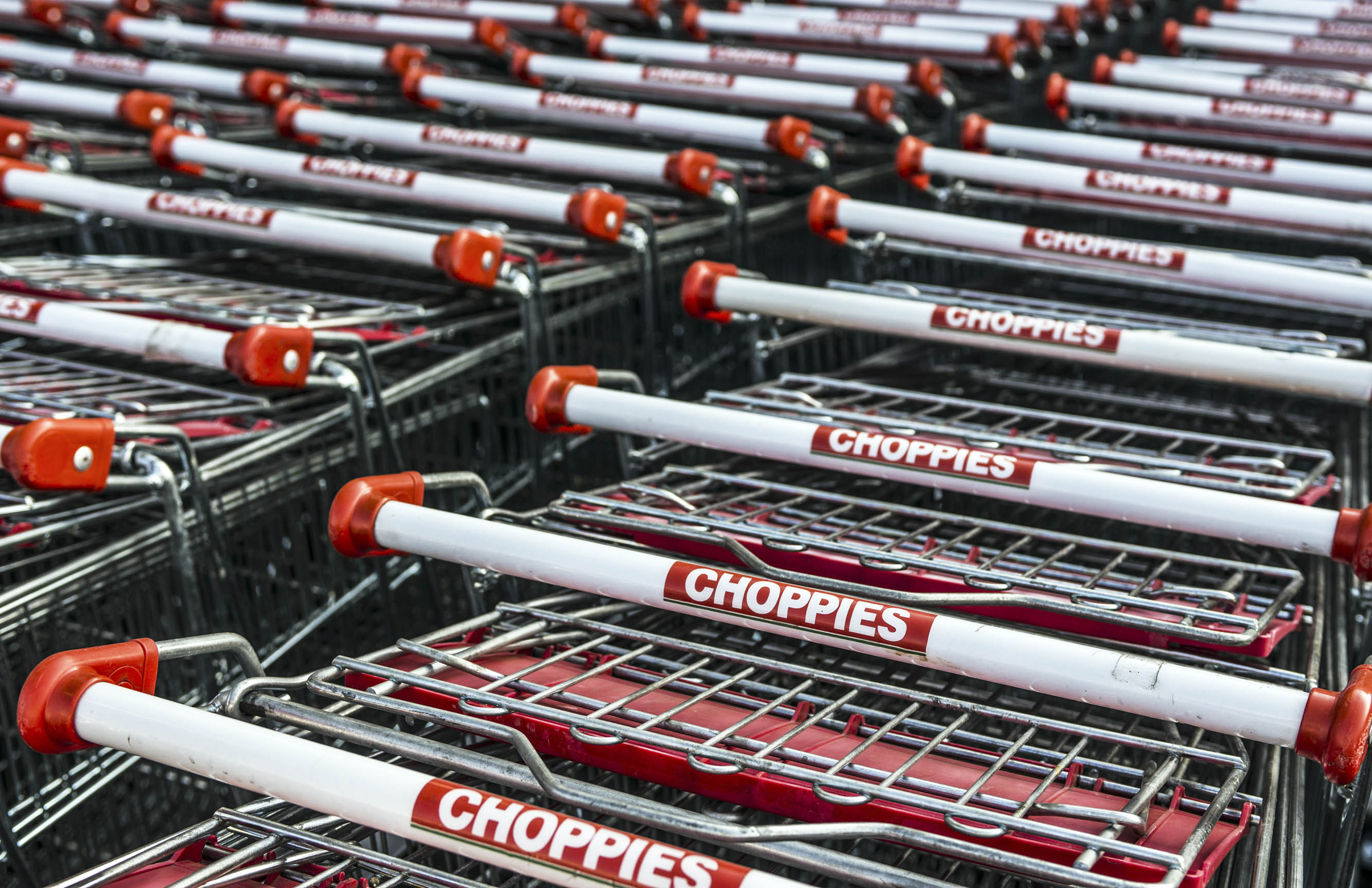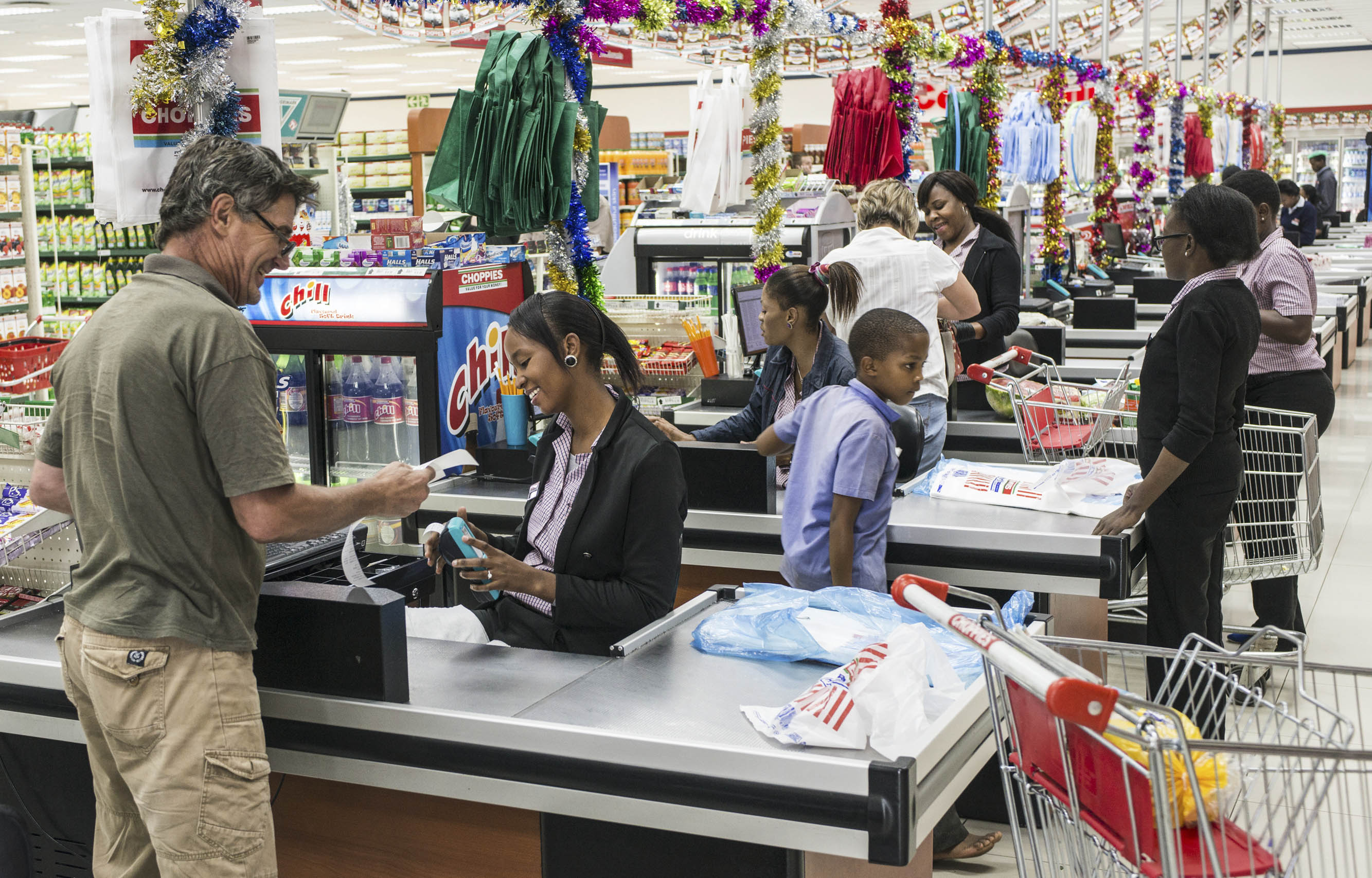Choppies, which began as a general dealer called Wayside Supermarket in Botswana, has grown into a major retailer in seven other Southern Africa countries, including in Zeerust,
South Africa. (Waldo Swiegers/Bloomberg/Getty Images)
Choppies began life as a struggling general dealer in Botswana and now consists of about 250 stores in eight countries. But this rag-to-riches story is on the brink of an unhappy ending
Gaborone — When Ramachandran Ottapathu arrived in Lobatse, Botswana, he had just one mission: to turn around the Chopdat family’s struggling general dealership.
“You know, it’s just a gamble we took with Ram,” says Abu Chopdat, the youngest and least guarded of the Chopdat brothers, with a sense of disbelief in his voice because no one — not least the Chopdat brothers, who at the time were running their father’s business into the ground —could have predicted that the gamble would pay off quite so spectacularly.
Nearly three decades later, the Chopdats are multimillionaires. Ram himself (everyone calls him Ram) is worth anywhere from $60-million to $300-million and Choppies has arguably become Botswana’s most successful company. It is now a multinational supermarket chain with more than 250 stores in eight countries that is giving the likes of Shoprite, Spar and Checkers a run for their money.
This is the story of how Ram did it — and why the retail giant that he created may yet be snatched away from him.

Ramachandran Ottapathu created the retail giant and became a multimillionaire, but he has been suspended from his duties as chief executive of Choppies. (Waldo Swiegers/Bloomberg/Getty Images)
In the early 1990s, Ram was a hot-shot accountant competing with thousands of other hot-shot accountants in the Indian state of Kerala. To make his fortune, he knew he needed to leave India, which at the time was struggling economically. Someone from his area was working in Botswana and offered him an opportunity to work there. He didn’t think twice.
“Look, this was the first job offer with decent money. Had it been from the moon, I would have gone there,” he says, speaking to the Mail & Guardian from his office at the charitable foundation that he runs in Gaborone. It is sparsely furnished — little more than a desk and a filing cabinet — and does not look like the office of one of Botswana’s richest men.
His main office, at the Choppies headquarters nearby, may be more opulent, but Ram is not allowed on the premises.
The job was at an audit firm in Lobatse, and Ram was tasked with doing the books for one of their clients, the Wayside Supermarket, which sold cheap appliances such as clocks, sewing machines, radios and TVs, mostly to Zimbabweans who came on the train from Bulawayo. But the business was in bad shape. Blame the end of apartheid: as South Africa opened up, so their customers went shopping there instead.
The Chopdat brothers — especially the eldest, who dropped the Chopdat name and goes by Farouk Ismail — gave Ram free reign to turn the Wayside Supermarket around. They were desperate to keep it afloat, because, for them, it was more than just a business. Their father, the patriarch of the family, had arrived in Southern Africa in a wave of immigration from India in the 1960s. Most of these migrants ended up labouring on the sugar cane fields near Durban, but Chopdat senior had tried his luck inland, slowly working his away up the ladder until he was the proud owner of his own shop. When he died, his three sons had a legacy to uphold.
It was an exciting time for Ram, who finally got a chance to put his education into practice. “I was young. I could experiment and do what is good for the business, and what is not good for business … We started doing small things, changing around.”
Through hard work and sensible management, Ram rescued the Wayside Supermarket from insolvency. Then he left the audit firm and joined the business full-time. He sensed that there was potential for further growth. He was the only one.
In 1998, Ram and Ismail opened up a store in Gaborone. By then it was no longer the Wayside Supermarket, or a general dealer: it was Choppies, and it had evolved into a supermarket catering for lower-middle class people, with another branch in Lobatse. Thanks to Ram’s changes, the two Lobatse stores were making money; the Gaborone branch did well too. But further expansion seemed like a distant dream, until Botswana devalued its currency in 2003. The decision hurt other retailers, but Choppies had enough cash to weather the storm, and suddenly they found themselves in a position to pick up other stores on the cheap.
But who would manage the new stores? How could what was still a small family business find enough people it could trust?
Lukas Spiropolous, a researcher and historian at the University of the Witwatersrand, studies Indian migrant communities in Southern Africa. He made Choppies one of his case studies, because Ram found an all too familiar solution to this problem — one that migrant communities in the region have been employing for centuries. “Ram began to bring in family with the relevant training, including his accountant wife, who could run the various elements of the business as it expanded and required more and more staff. This approach to filling skills gaps would form the basis for the successful expansion of the supermarkets throughout the country and into South Africa — likely the first Botswana firm to make that transnational expansion on a large scale.”
As of 2016, more than 500 people from Ram’s home town of Ollur in Kerala had worked for Choppies at some stage, Ram told Forbes business magazine in 2016. Although Ram says that a process of localisation has been successful and that this number is now much lower, a Choppies employee told the M&G that there are at least 100 Indians in senior management positions.
“Loyalty is very important in this modern world. You can buy diligence by paying money, okay. You can’t buy loyalty by paying money,” says Ram.
As Choppies acquired more and more stores, so Ram refined the model, explained Spiropolous. “The model in question … focuses on the acquisition of further skilled employees from India who are able to fill in the holes in the system. The system involves recruiting accountants and management school graduates with MBAs from universities and businesses in India and, in some cases, Dubai. The accountants are put to work in the financial office of the group while the MBAs are posted to management of individual stores in the chain. In the relatively skill-poor Southern African region, a supermarket manager with an MBA is essentially unheard of.”
This gave Choppies a major competitive advantage. But it wasn’t the only one. It also helped that the bigger Choppies grew, the closer its relationship became with high-ranking officials in Botswana’s government.
“It’s a small society, we all know each other,” says Ram.
But in, for example, Mozambique, Choppies has made no inroads with the government. “A place like Mozambique, we find it difficult that we don’t have a relationship,” says Ram. “We have to make a call whether to continue business there or not.”
Investigative journalists who have looked closely at Choppies have raised questions about the nature of the relationship between the company and the government. In 2015, amaBhungane found that “Choppies has delivered business and financial benefits to powerful members of the Botswana elite, including President Ian Khama, former president Festus Mogae and the head of the shadowy directorate of intelligence and security, Isaac Kgosi.” In return, the company “received favourable treatment from the Botswana government, notably over work permits for expatriate employees, mostly from the Indian subcontinent”.
In a follow-up story in 2016, amaBhungane reported allegations that the spy chief had helped to bury an investigation into alleged health and safety violations at Choppies stores. Kgosi denies this.
Questions have also been asked about the fact that, in Zimbabwe, Choppies’s local partner is former vice-president Phelekezela Mphoko. In January this year, several Choppies stores in Zimbabwe were targeted by anti-government protestors.
Ram vehemently denies any wrongdoing. But Abu Chopdat admits that politicians benefited from the company’s largesse — although he is not too sure that those same politicians have upheld their end of the bargain. “Certain people are given shares for free, you know what I mean? And then people go and do this to the man.”
Choppies’s rise over the past decade has been so fast that Ram himself has barely been able to keep up. He used to drive tens of thousands of kilometres a year to check in personally on stores. But in 2010 the company bought a private plane, paying cash, to ferry him and senior management between the dozens of new stores that were opening up every year.
In 2008, the first store outside of Botswana was opened in Zeerust in South Africa. There was powerful symbolism at play here: it showed that Choppies was intent on taking the fight to the major South African retailers, who have tried their best to make it hard for Choppies over the years.
“I don’t want to mention names,” says Ram, before outlining how South African companies put pressure on suppliers to withdraw products from Choppies stories, blocked Choppies from obtaining prime premises and threatened to stop doing business with clearing agents who were moving Choppies trucks across borders.
In 2012, Choppies listed on the Botswana Stock Exchange. More significantly, in May 2015 it was approved for a secondary listing on the JSE, Africa’s largest exchange, which raised $45-million for further expansion. No one doubts that Ram was the driving force behind this incredible growth. “He’s a master tactician,” Abu Chopdat says.

(Waldo Swiegers/Bloomberg/Getty Images)
Today Choppies operates in Botswana, South Africa, Zimbabwe, Zambia, Kenya, Tanzania, Mozambique and Namibia, and employs more than 17 000 people in its 250-plus stores. But Ram is convinced that the company is nowhere near reaching its full potential. After all, he says, Southern Africa — by which he means all the way from Botswana’s border with South Africa up to Kenya and Uganda — is one of the world’s last frontiers for retail expansion.
“What we’ve done is nothing compared to what the opportunities are on the ground,” he says.
A Brookings Institution report from December 2018 says that consumer spending in Africa will surpass $2-trillion within the next few years — a 30% increase from 2015 levels. This, the report adds, is a conservative estimate. Ram believes that Choppies is uniquely positioned to take advantage of this growth.
Unlike the South African chains, he says, Choppies does not believe in a one-size-fits-all approach. “You should not say I’m a Botswana company, I’m going to run it in the Botswana way, that’s not going to work … because we are an African outlet, not just a South African outfit, that makes a big difference. We will not just look at South African merchandise, we give priority to local merchandise. Sometimes if you go with a certain set of views you are bound to get road-blocked. We didn’t have that.”
Practically, this manifests in how Choppies prices and markets its products. A typical Choppies store is aimed at a lower middle-class market, so top billing is given to bulk packs (10kg or more) of maize meal, flour and sugar, which are often sold at cost to keep customers coming into the shop. Some things vary from country to country: in Botswana his customers like to buy their chicken in pieces and their milk in cartons, so that’s what gets priority on the shelves; whereas in Zambia whole chickens and 250 millilitre milk sachets are far more popular.

(Waldo Swiegers/Bloomberg/Getty Images)
These differences are a window into national identities and cultural differences. When Ram travels, the first thing he does is walk through the aisles of the local supermarket, because that will tell him more than any guide book ever could. He is sure that Wouter Basson, the former chief executive of Shoprite, does the same.
In November last year, trading in Choppies shares on both the Botswana and Johannesburg stock exchanges was suspended with immediate effect. The company had failed to release results for the latest financial year. That was because newly-appointed auditors PwC found several accounting irregularities that required further investigation — raising awkward questions, yet again, for former auditors KPMG.
In May this year, Ram was suspended as chief executive of the Choppies Group. The board, led by Mogae, says this was “as a result of an aggregation of activities and conduct by the suspended CEO”, which it would elaborate on “in due course”, although no such elaboration has been forthcoming.
Ram’s suspension casts the Choppies story in a new and distinctly more suspicious light. Is the company’s remarkable rise a case study in how to turn a struggling general trader into a successful multinational? Or did it get to where it is today by cutting corners, cooking books and cosying up to power?
“Only I can say maybe that corporate governance is not followed properly, or there is some procedural faults and things like that, because the company was also growing, but I doubt anything else beyond that,” says Ram. “Personally, I can guarantee you there is no management or executives who have taken any personal benefit out of it.”
But Ram warns that Choppies may not be able to survive without him. Given its business model — and the fact that he is a 20% shareholder — this is no idle threat. “You know, leaving the man who built the company outside … the value destruction is going to be much more than whoever can anticipate or imagine.”

(Waldo Swiegers/Bloomberg/Getty Images)
Ismail, who took that gamble on Ram so many years ago, has been appointed as acting chief executive in Ram’s absence. Although Ram is no longer allowed to work from his own office, he continues to monitor the business, doing the rounds of the Gaborone stores most days. In a sign of his enduring control, the Choppies marketing team — run by a former journalist from Ram’s Kerala hometown — is still working on Ram’s behalf.
But some things are clearly beginning to fray. In Kenya, for example, Choppies was forced to close two of its 15 branches over the past couples of months after failing to pay suppliers and employees. It was another humiliating reality check in a year that has been full of them.
Maybe Choppies, and Ram, will emerge stronger from these difficulties.
“The principles that you apply to one store, and the principles you apply to 88 stores in the country, they are not the same,” says Tito Chengeta of the marketing department at Choppies. “The structure for Choppies grew with Ram as the nucleus … when you are running five stores, you can become the manager who can check on all five stores but once you reach a certain number of stores, that’s beyond your individual ability to supervise all these stores.
“And I think with the audit now, they’ve discovered a lot of things that Choppies still carried over that are mom and pop style, and should not be there. After this, maybe Ram will not have to leave the office at 12 at night, maybe he will not have to work so hard.”
And if it doesn’t work out — well, Ram, with all his millions, will be just fine. So will the Chopdat family, who enjoy riches that their father could scarcely have imagined when he boarded that boat to Durban.
“Me, I’m having three meals a day, I’ve got a wife, a family, you know, I can sleep. At night my thing can stand,” says Abu Chopdat, sitting in the manager’s office at the site of the original Wayside Supermarket in Lobatse, a naughty grin on his face. “We came with nothing. We go with nothing. Be humble. Be good to people. God will always bless you.”